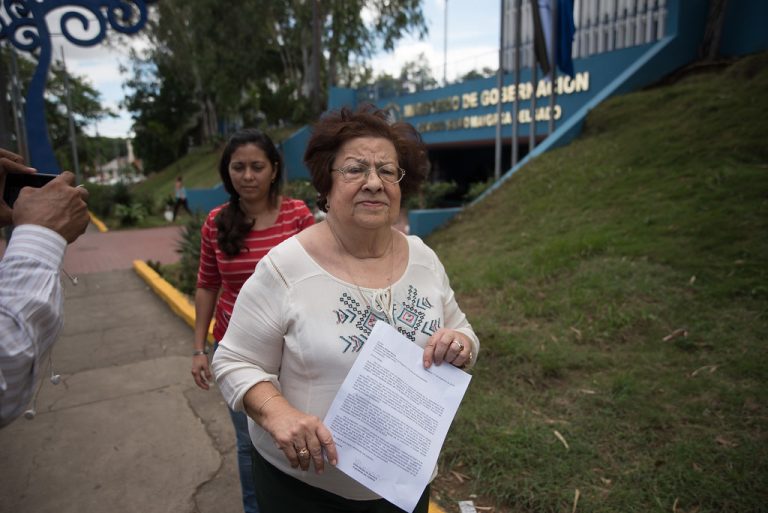
Children of Exile: The Births “Sowing Hope” in the Camp of Nicaraguan Farmers

PUBLICIDAD 1M
PUBLICIDAD 4D
PUBLICIDAD 5D
Nunez warns that the Government manipulates the principle of non-repetition at its convenience, to curtail constitutional rights to political prisoners

Nunez warns that the Government manipulates the principle of non-repetition at its convenience
The self-amnesty decreed by the government of Daniel Ortega and Rosario Murillo, with the rubber stamp of the National Assembly, cannot be a “clean slate and a fresh start”, after the serious violations of human rights and crimes against humanity committed by the regime, says the President of the Nicaraguan Center for Human Rights (CENIDH), Vilma Nunez de Escorcia.
The human rights defender believes that, far from the objective of the dictatorship to protect the perpetrators of the massacre, self-amnesties are prohibited in international law, and therefore Ortega, Murillo and their accomplices will not escape international justice or the sanctions of the international community which she believes “the Government of Ortega deserves.”
“If this law is going to have some effect, it is going to be that the impunity continues,” alerted Nunez. However, she considers that this “will only last while Ortega remains in power and the institutions are not revamped.”
In addition, Nunez highlights the urgency of creating an International Commission against Impunity and Corruption in Nicaragua, similar to the one established in Guatemala or the Support Mission against Impunity and Corruption of Honduras.
In the case of Nicaragua, she explains, such a commission should be integrated with international experts and the national judicial institutions that must be renewed with honesty and independence, in order to investigate the criminal responsibilities of the massacre and to prosecute before international justice.
Perpetrators will not be protected
Nunez reiterated that the self-amnesty will not protect the perpetrators of human rights violations, which CENIDH knows first-hand, because of its role as a companion to the victims of Ortega’s repression against the citizens’ protests of the April Rebellion, to which the dictatorship responded by cancelling its legal status and confiscating its facilities in December of 2018.
“It is a desperate effort of the dictatorship to try and silence all the claims and see if it stops the wave of lawsuits and sanctions that are coming soon,” said the defender in an interview with Carlos F. Chamorro, for the Sunday program “Esta Semana” (This Week).
Nunez agreed with the warnings already made by the Office of the High Commissioner for Human Rights of the UN, headed by Chilean ex-president Michelle Bachelet, when she assured that “an amnesty law cannot in any way eliminate the responsibility of those who committed crimes against humanity or serious violations of human rights, because under international law they cannot receive amnesty.”
At the end of December, the Interdisciplinary Group of Independent Experts presented a comprehensive and detailed final report on its work between April and May 2018, during the first months of the repression, confirming that the Ortega Government committed crimes against humanity for which it must be investigated and tried before international justice.
Nunez recalled that those crimes against humanity of the dictatorship have no time limit for prosecution. “Even if Daniel Ortega delays his departure from the country or international justice is late in sitting him on the bench he deserves, which is the defendant’s bench in front of international judges, he will always have criminal responsibility until he dies,” she noted.
Manipulation of terms
The Government tries to justify the approval of its self-amnesty under the commitment to release political prisoners who still remain in the prisons of the dictatorship and grant full freedom to those already released, who continue as political hostages under the regime of family coexistence or house arrest.
However, that same commitment was already broken by the government, by not complying with the agreements signed with the Civic Alliance for Justice and Democracy, at the end of March, with the Organization of American States (OAS) and the Vatican as witnesses.
Article one of the now Law 996, establishes that “the amnesty extends to persons who have not been investigated, that are in investigation process, in criminal proceedings to determine responsibility and in compliance with execution of sentences,” therefore, all are free beginning with the coming into force of the law, with its publication in the official Gazzette newspaper.
However, Nunez warns that article three of the same law prohibits the participation of political prisoners in any activity related to the crimes for which they were prosecuted or subjects of investigation, citing the principle of “non-repetition.”
This condition, in the language of the Government, would inhibit political prisoners and citizens in general from participating in any demonstration against the government, because the ruling party classifies these actions as an alleged failed attempt of a “coup d’etat.”
Nunez argues that this article three “is unconstitutional,” because you cannot prohibit the exercise of political rights, which the government has already violated with a de facto state of siege established since late September, when the ban of demonstrations and citizens’ gatherings were ordered.
The restoration of these constitutional rights and freedoms, including mobilization, peaceful association, freedom of expression and the press, are also part of the agreements at the negotiation table, which the Government also fails to comply with.
“We all live under a state of siege…harassment will not disappear, because of the perverse espionage of the dictatorship,” the human rights defender predicted.
In addition, she believes that the Government “tampers” in that article the term of “non-repetition,” because this principle of transitional justice “is applicable to them,” as the ones responsible of the massacre, “and not to the victims” as the dictatorship tries to present.
Thank you for reading our English section, brought to you in collaboration with Havana Times. If you wish to subscribe to our English Weekly Newsletter, you can do it here. Please spread the word and share this link with your friends, family or contacts.
Regards,
Archivado como:
PUBLICIDAD 3M
PUBLICIDAD 3D